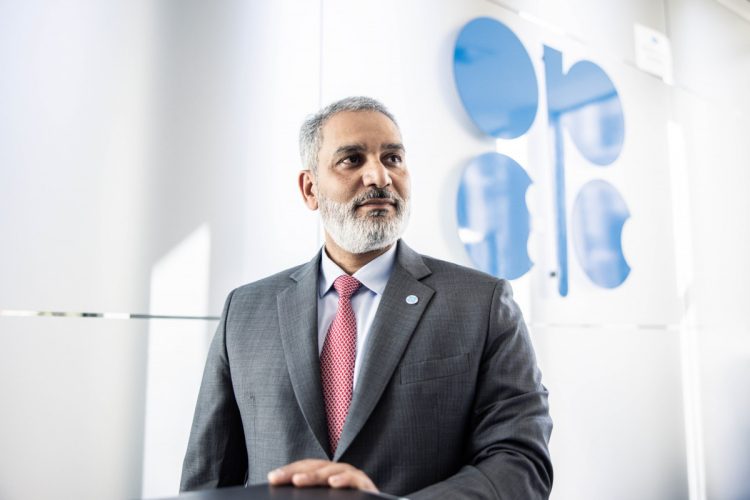Publisher: Maaal International Media Company
License: 465734
OPEC: Oil exploration and extraction sector requires investments amounting to $11.1 trillion by 2045
Haitham Al-Ghais, Secretary-General of the Organization of Petroleum Exporting Countries (OPEC), revealed that the increase in investments in the oil industry comes in light of the increase in global demand for energy, as the exploration and extraction sector requires investments estimated at about 11.1 trillion dollars, the refining and manufacturing sector about 1.7 trillion dollars, while the transportation sector requires Marketing will allocate investments of $1.2 trillion by 2045.
He stressed that securing the necessary supplies of oil that the world needs requires pumping more investments into various oil industry activities in light of the expected increase in global consumption of “energy,” which constitutes an essential foundation for continuing the momentum of global economic growth.
According to the Emirates News Agency, Haitham Al-Ghais said: “Allocating more investments in the oil industry would contribute to enhancing the sustainability of the global energy sector, securing sufficient and reliable supplies for the whole world and ensuring safe supplies for future generations.”
اقرأ المزيد
He added: “The importance of these investments is not limited only to enhancing global energy security, but will also contribute significantly to developing the technologies required to reduce emissions. Therefore, the organization and its member states continue to emphasize the importance of pumping the necessary investments in this vital sector because it is closely linked to the sustainability of the energy sector and ensuring security.” supplies and reducing emissions.”
The Secretary-General of OPEC stressed that the member states of the organization play important leadership roles in many critical issues that concern the entire world to find realistic, responsible and comprehensive solutions, especially the issues of climate change and energy transition.
He said that the organization and its members participated in the negotiations related to climate change after it obtained observer status in the Conferences of the Parties (COP), as a result of the member states’ belief in the importance of this issue to the world. He explained that OPEC provides continuous support to its members in this regard through several ways, including Facilitating the process of exchanging information, especially regarding best practices, and this supportive role contributes to developing and implementing effective strategies to reduce emissions and develop the energy and oil industry to make it more environmentally friendly.
The Secretary-General of OPEC explained that all member states of the organization are continuously announcing and implementing effective initiatives and projects to support these efforts by making very ambitious contributions as part of their national goals under the Paris Climate Change Agreement or through unique constructive initiatives.
Haitham Al-Ghais pointed out that the member states of the organization benefit from their diverse natural resources and the expertise they have gained over the years, especially in the oil and energy sectors, and make huge investments in order to develop technology and innovative techniques that in turn contribute to reducing emissions, including capturing, storing and using carbon and enhanced oil extraction through the use of second-hand oil. Carbon dioxide, direct capture of carbon from the air, and reducing emissions by reducing carbon concentration in all sectors of the oil industry “exploration, extraction, transportation, marketing, refining, and manufacturing.” All of these technologies play an important role in reducing emissions and providing energy in a sustainable and environmentally friendly manner.
Al-Ghais said that the member states of the organization have made significant investments in the oil industry and other energy industries such as hydrogen, renewable energy, and the technologies required to reduce carbon emissions, in order to ensure global energy security and continuity of supplies.
The Secretary-General of OPEC stressed that the role of vital oil is not limited to being an important main source of energy, but that oil and its derivatives are involved in the manufacture of other forms of energy, such as renewable energy, explaining that oil is the basis for providing this industry with the raw materials that it needs to manufacture wind turbines and solar panels. In addition to lithium-ion batteries used in electric cars.
Haitham Al-Ghais noted that oil plays a pivotal role in making the lives of millions of people more prosperous and advanced. The benefit of oil is not limited to its role as an available and reliable source of energy, but rather oil and its derivatives have many benefits that are difficult to enumerate, since its discovery several decades ago and it plays an important role in various areas of life.
He pointed out that the uses of oil and its derivatives contribute to facilitating daily life around the world, as oil plays a major role in air, sea and land transportation, emergency vehicles, food production, packaging and storage, in addition to its great importance in the manufacture of medicines, hospital equipment and medical supplies, in addition to its involvement in the manufacture of wind turbines and solar panels. And lithium-ion batteries that are used in electric cars, in addition to supporting global industrial production, so that its role in promoting global economic growth is evident. He explained that the United Nations recently indicated in one of its reports that about 675 million people in the world lack any source of electricity generation, and therefore the importance of the oil industry is highlighted. Investing in and developing it with great attention to environmental standards.








